Memorandum of Advice: Nullity of Marriage and Family Law Act
VerifiedAdded on 2023/01/17
|7
|2256
|42
Report
AI Summary
This memorandum of advice addresses the legal aspects of nullity of marriage, specifically focusing on the case of Aibi Razma and George Omer. It examines the validity of their marriage under the Marriage Act 1961 and the Family Law Act 1975, considering factors such as age, consent, and international recognition. The memorandum explores the implications of the Hague Convention on Marriages and the Apostille Treaty of 1961, particularly concerning the required certifications. It further analyzes the applicability of Australian family law, including the jurisdiction of the Family Court of Australia and the Supreme Court of Victoria, and the potential for arbitration and family dispute resolution. The advice considers the welfare of the child, Rabia, and the importance of her views in custody decisions. The memorandum suggests arbitration as a timely and cost-effective solution, emphasizing the need for a declaration of nullity to facilitate Aibi Razma's plans for a second marriage and to avoid bigamy charges. It also discusses the registration requirements of the marriage and the relevance of the Family Law Act provisions regarding the solemnization of marriage, ultimately recommending arbitration to achieve a prompt resolution.
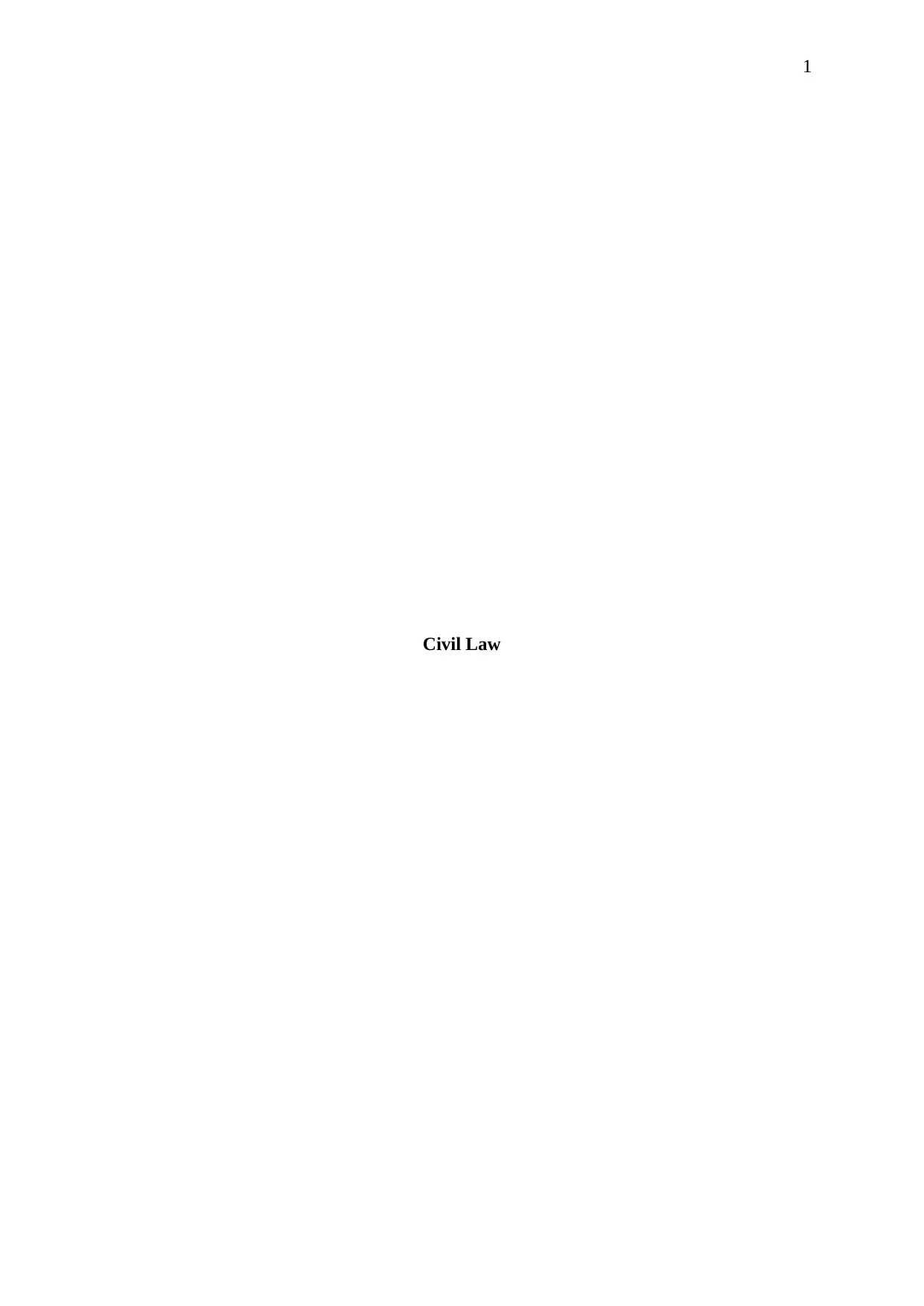
1
Civil Law
Civil Law
Paraphrase This Document
Need a fresh take? Get an instant paraphrase of this document with our AI Paraphraser
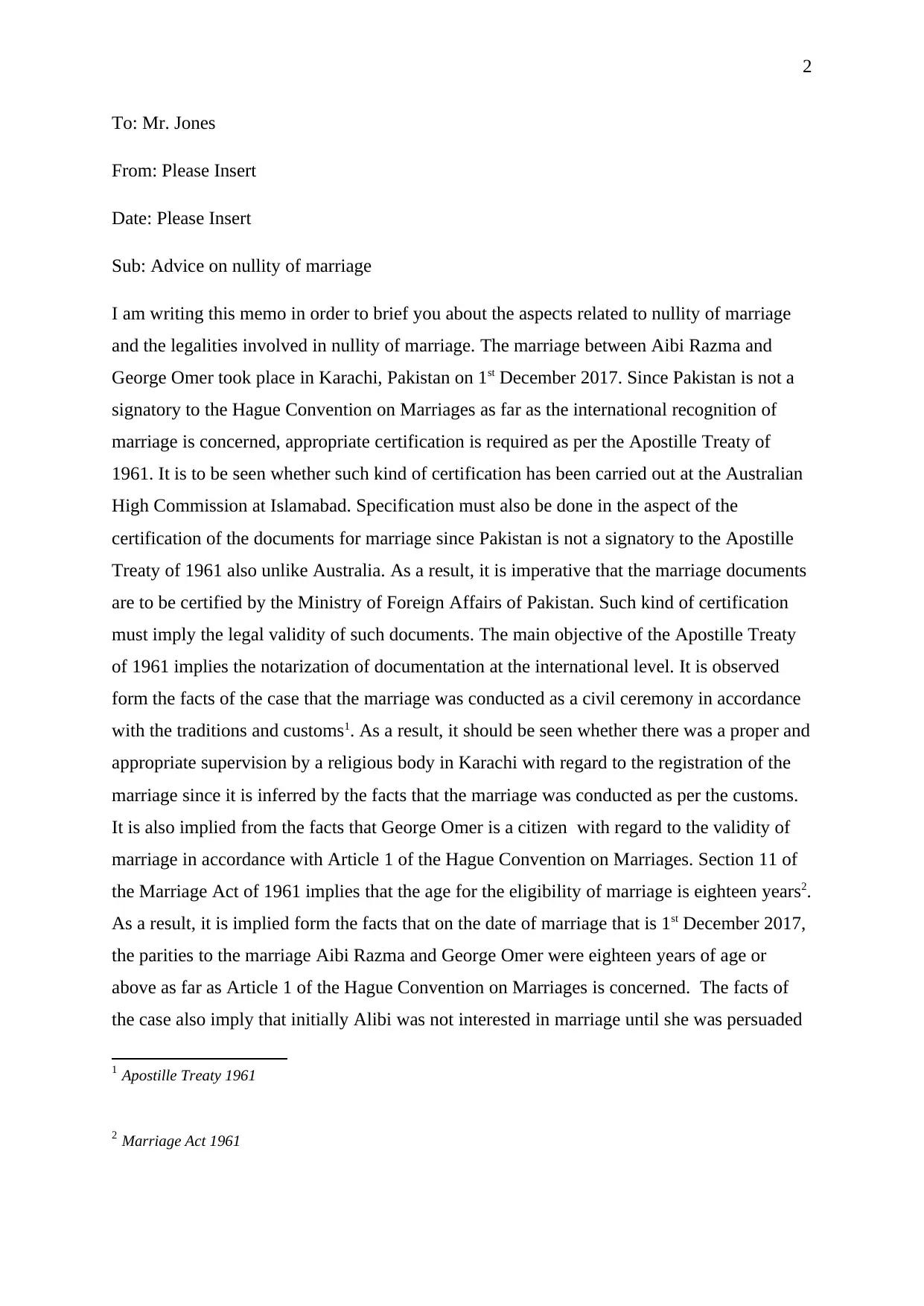
2
To: Mr. Jones
From: Please Insert
Date: Please Insert
Sub: Advice on nullity of marriage
I am writing this memo in order to brief you about the aspects related to nullity of marriage
and the legalities involved in nullity of marriage. The marriage between Aibi Razma and
George Omer took place in Karachi, Pakistan on 1st December 2017. Since Pakistan is not a
signatory to the Hague Convention on Marriages as far as the international recognition of
marriage is concerned, appropriate certification is required as per the Apostille Treaty of
1961. It is to be seen whether such kind of certification has been carried out at the Australian
High Commission at Islamabad. Specification must also be done in the aspect of the
certification of the documents for marriage since Pakistan is not a signatory to the Apostille
Treaty of 1961 also unlike Australia. As a result, it is imperative that the marriage documents
are to be certified by the Ministry of Foreign Affairs of Pakistan. Such kind of certification
must imply the legal validity of such documents. The main objective of the Apostille Treaty
of 1961 implies the notarization of documentation at the international level. It is observed
form the facts of the case that the marriage was conducted as a civil ceremony in accordance
with the traditions and customs1. As a result, it should be seen whether there was a proper and
appropriate supervision by a religious body in Karachi with regard to the registration of the
marriage since it is inferred by the facts that the marriage was conducted as per the customs.
It is also implied from the facts that George Omer is a citizen with regard to the validity of
marriage in accordance with Article 1 of the Hague Convention on Marriages. Section 11 of
the Marriage Act of 1961 implies that the age for the eligibility of marriage is eighteen years2.
As a result, it is implied form the facts that on the date of marriage that is 1st December 2017,
the parities to the marriage Aibi Razma and George Omer were eighteen years of age or
above as far as Article 1 of the Hague Convention on Marriages is concerned. The facts of
the case also imply that initially Alibi was not interested in marriage until she was persuaded
1 Apostille Treaty 1961
2 Marriage Act 1961
To: Mr. Jones
From: Please Insert
Date: Please Insert
Sub: Advice on nullity of marriage
I am writing this memo in order to brief you about the aspects related to nullity of marriage
and the legalities involved in nullity of marriage. The marriage between Aibi Razma and
George Omer took place in Karachi, Pakistan on 1st December 2017. Since Pakistan is not a
signatory to the Hague Convention on Marriages as far as the international recognition of
marriage is concerned, appropriate certification is required as per the Apostille Treaty of
1961. It is to be seen whether such kind of certification has been carried out at the Australian
High Commission at Islamabad. Specification must also be done in the aspect of the
certification of the documents for marriage since Pakistan is not a signatory to the Apostille
Treaty of 1961 also unlike Australia. As a result, it is imperative that the marriage documents
are to be certified by the Ministry of Foreign Affairs of Pakistan. Such kind of certification
must imply the legal validity of such documents. The main objective of the Apostille Treaty
of 1961 implies the notarization of documentation at the international level. It is observed
form the facts of the case that the marriage was conducted as a civil ceremony in accordance
with the traditions and customs1. As a result, it should be seen whether there was a proper and
appropriate supervision by a religious body in Karachi with regard to the registration of the
marriage since it is inferred by the facts that the marriage was conducted as per the customs.
It is also implied from the facts that George Omer is a citizen with regard to the validity of
marriage in accordance with Article 1 of the Hague Convention on Marriages. Section 11 of
the Marriage Act of 1961 implies that the age for the eligibility of marriage is eighteen years2.
As a result, it is implied form the facts that on the date of marriage that is 1st December 2017,
the parities to the marriage Aibi Razma and George Omer were eighteen years of age or
above as far as Article 1 of the Hague Convention on Marriages is concerned. The facts of
the case also imply that initially Alibi was not interested in marriage until she was persuaded
1 Apostille Treaty 1961
2 Marriage Act 1961
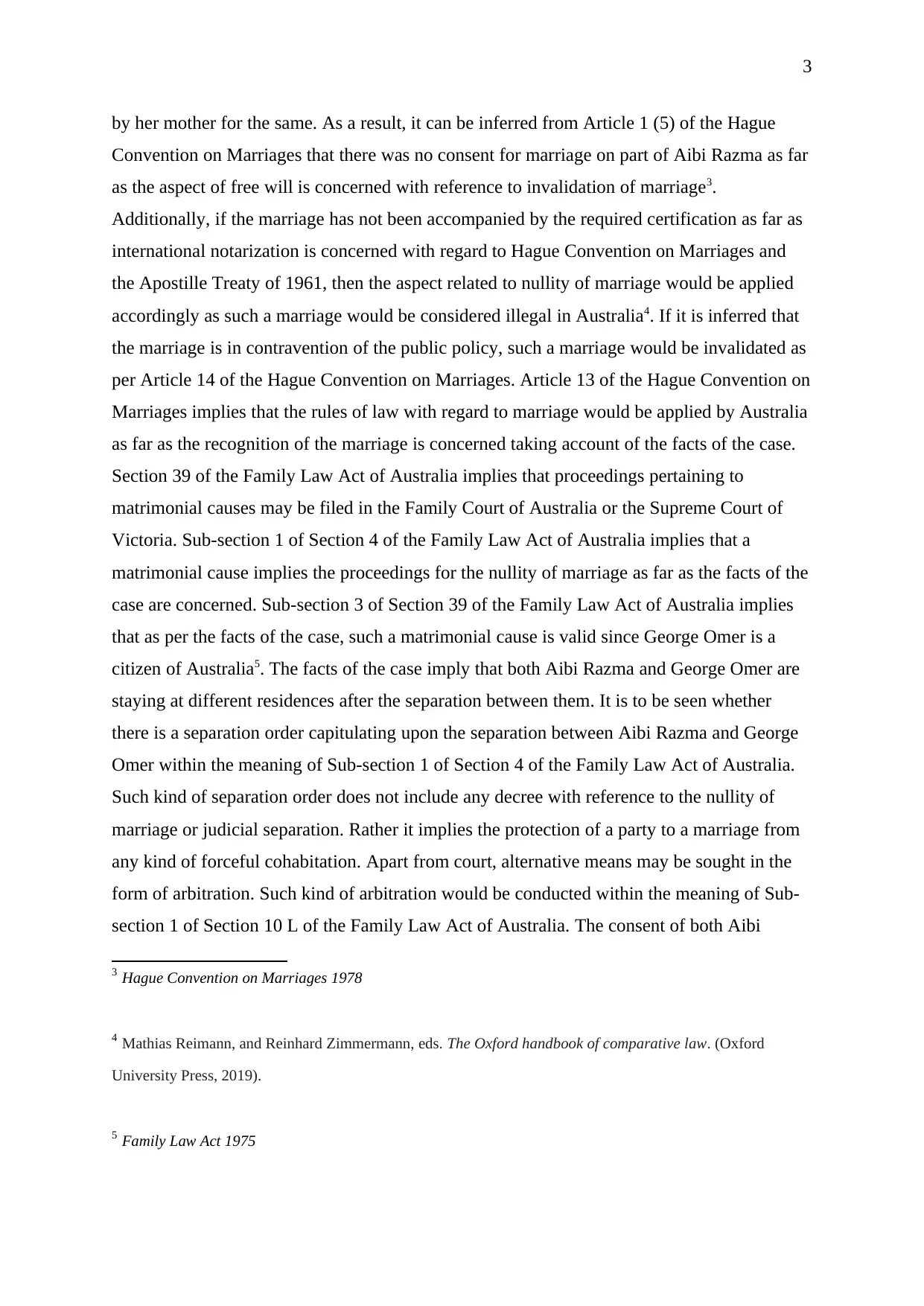
3
by her mother for the same. As a result, it can be inferred from Article 1 (5) of the Hague
Convention on Marriages that there was no consent for marriage on part of Aibi Razma as far
as the aspect of free will is concerned with reference to invalidation of marriage3.
Additionally, if the marriage has not been accompanied by the required certification as far as
international notarization is concerned with regard to Hague Convention on Marriages and
the Apostille Treaty of 1961, then the aspect related to nullity of marriage would be applied
accordingly as such a marriage would be considered illegal in Australia4. If it is inferred that
the marriage is in contravention of the public policy, such a marriage would be invalidated as
per Article 14 of the Hague Convention on Marriages. Article 13 of the Hague Convention on
Marriages implies that the rules of law with regard to marriage would be applied by Australia
as far as the recognition of the marriage is concerned taking account of the facts of the case.
Section 39 of the Family Law Act of Australia implies that proceedings pertaining to
matrimonial causes may be filed in the Family Court of Australia or the Supreme Court of
Victoria. Sub-section 1 of Section 4 of the Family Law Act of Australia implies that a
matrimonial cause implies the proceedings for the nullity of marriage as far as the facts of the
case are concerned. Sub-section 3 of Section 39 of the Family Law Act of Australia implies
that as per the facts of the case, such a matrimonial cause is valid since George Omer is a
citizen of Australia5. The facts of the case imply that both Aibi Razma and George Omer are
staying at different residences after the separation between them. It is to be seen whether
there is a separation order capitulating upon the separation between Aibi Razma and George
Omer within the meaning of Sub-section 1 of Section 4 of the Family Law Act of Australia.
Such kind of separation order does not include any decree with reference to the nullity of
marriage or judicial separation. Rather it implies the protection of a party to a marriage from
any kind of forceful cohabitation. Apart from court, alternative means may be sought in the
form of arbitration. Such kind of arbitration would be conducted within the meaning of Sub-
section 1 of Section 10 L of the Family Law Act of Australia. The consent of both Aibi
3 Hague Convention on Marriages 1978
4 Mathias Reimann, and Reinhard Zimmermann, eds. The Oxford handbook of comparative law. (Oxford
University Press, 2019).
5 Family Law Act 1975
by her mother for the same. As a result, it can be inferred from Article 1 (5) of the Hague
Convention on Marriages that there was no consent for marriage on part of Aibi Razma as far
as the aspect of free will is concerned with reference to invalidation of marriage3.
Additionally, if the marriage has not been accompanied by the required certification as far as
international notarization is concerned with regard to Hague Convention on Marriages and
the Apostille Treaty of 1961, then the aspect related to nullity of marriage would be applied
accordingly as such a marriage would be considered illegal in Australia4. If it is inferred that
the marriage is in contravention of the public policy, such a marriage would be invalidated as
per Article 14 of the Hague Convention on Marriages. Article 13 of the Hague Convention on
Marriages implies that the rules of law with regard to marriage would be applied by Australia
as far as the recognition of the marriage is concerned taking account of the facts of the case.
Section 39 of the Family Law Act of Australia implies that proceedings pertaining to
matrimonial causes may be filed in the Family Court of Australia or the Supreme Court of
Victoria. Sub-section 1 of Section 4 of the Family Law Act of Australia implies that a
matrimonial cause implies the proceedings for the nullity of marriage as far as the facts of the
case are concerned. Sub-section 3 of Section 39 of the Family Law Act of Australia implies
that as per the facts of the case, such a matrimonial cause is valid since George Omer is a
citizen of Australia5. The facts of the case imply that both Aibi Razma and George Omer are
staying at different residences after the separation between them. It is to be seen whether
there is a separation order capitulating upon the separation between Aibi Razma and George
Omer within the meaning of Sub-section 1 of Section 4 of the Family Law Act of Australia.
Such kind of separation order does not include any decree with reference to the nullity of
marriage or judicial separation. Rather it implies the protection of a party to a marriage from
any kind of forceful cohabitation. Apart from court, alternative means may be sought in the
form of arbitration. Such kind of arbitration would be conducted within the meaning of Sub-
section 1 of Section 10 L of the Family Law Act of Australia. The consent of both Aibi
3 Hague Convention on Marriages 1978
4 Mathias Reimann, and Reinhard Zimmermann, eds. The Oxford handbook of comparative law. (Oxford
University Press, 2019).
5 Family Law Act 1975
⊘ This is a preview!⊘
Do you want full access?
Subscribe today to unlock all pages.

Trusted by 1+ million students worldwide
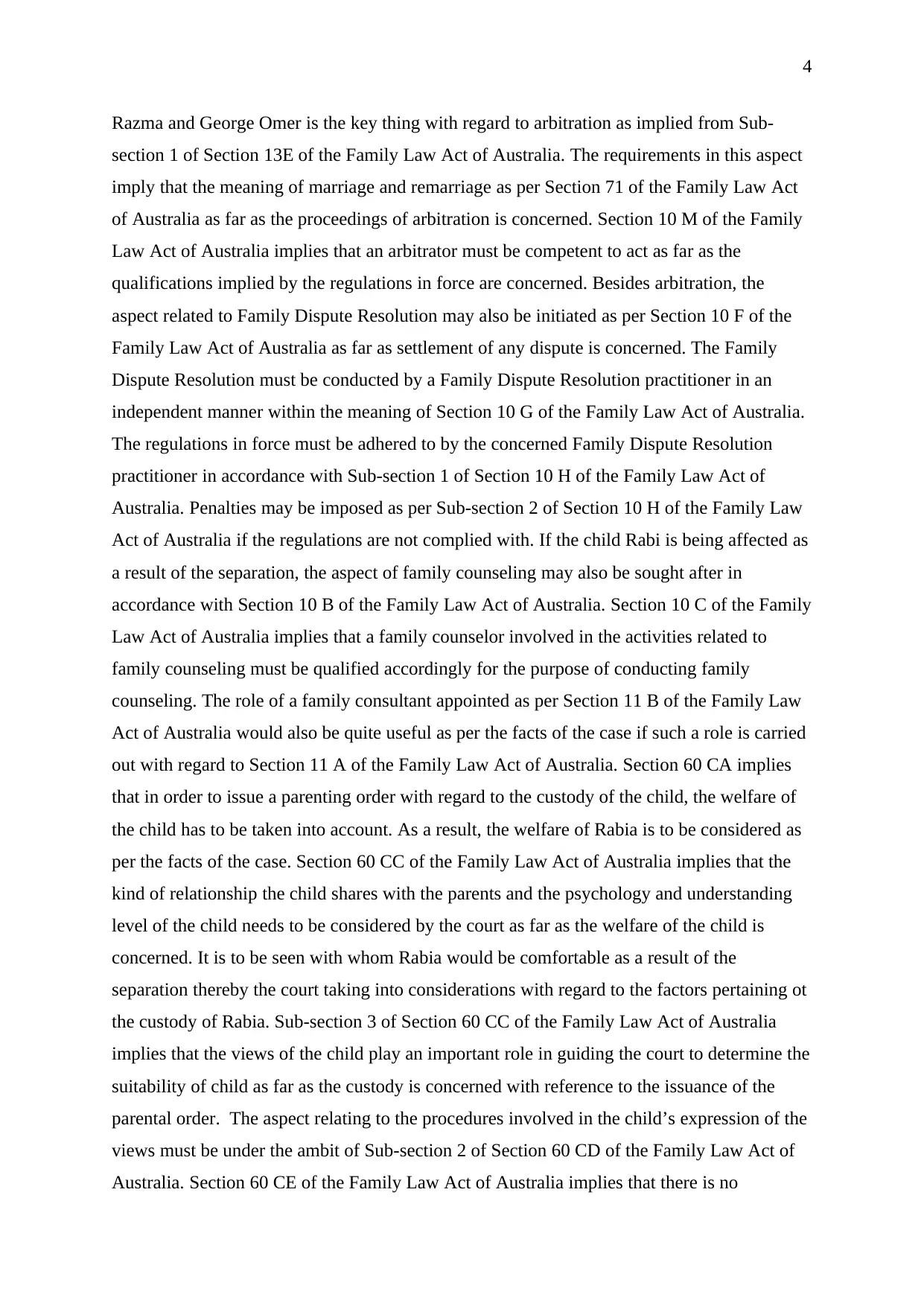
4
Razma and George Omer is the key thing with regard to arbitration as implied from Sub-
section 1 of Section 13E of the Family Law Act of Australia. The requirements in this aspect
imply that the meaning of marriage and remarriage as per Section 71 of the Family Law Act
of Australia as far as the proceedings of arbitration is concerned. Section 10 M of the Family
Law Act of Australia implies that an arbitrator must be competent to act as far as the
qualifications implied by the regulations in force are concerned. Besides arbitration, the
aspect related to Family Dispute Resolution may also be initiated as per Section 10 F of the
Family Law Act of Australia as far as settlement of any dispute is concerned. The Family
Dispute Resolution must be conducted by a Family Dispute Resolution practitioner in an
independent manner within the meaning of Section 10 G of the Family Law Act of Australia.
The regulations in force must be adhered to by the concerned Family Dispute Resolution
practitioner in accordance with Sub-section 1 of Section 10 H of the Family Law Act of
Australia. Penalties may be imposed as per Sub-section 2 of Section 10 H of the Family Law
Act of Australia if the regulations are not complied with. If the child Rabi is being affected as
a result of the separation, the aspect of family counseling may also be sought after in
accordance with Section 10 B of the Family Law Act of Australia. Section 10 C of the Family
Law Act of Australia implies that a family counselor involved in the activities related to
family counseling must be qualified accordingly for the purpose of conducting family
counseling. The role of a family consultant appointed as per Section 11 B of the Family Law
Act of Australia would also be quite useful as per the facts of the case if such a role is carried
out with regard to Section 11 A of the Family Law Act of Australia. Section 60 CA implies
that in order to issue a parenting order with regard to the custody of the child, the welfare of
the child has to be taken into account. As a result, the welfare of Rabia is to be considered as
per the facts of the case. Section 60 CC of the Family Law Act of Australia implies that the
kind of relationship the child shares with the parents and the psychology and understanding
level of the child needs to be considered by the court as far as the welfare of the child is
concerned. It is to be seen with whom Rabia would be comfortable as a result of the
separation thereby the court taking into considerations with regard to the factors pertaining ot
the custody of Rabia. Sub-section 3 of Section 60 CC of the Family Law Act of Australia
implies that the views of the child play an important role in guiding the court to determine the
suitability of child as far as the custody is concerned with reference to the issuance of the
parental order. The aspect relating to the procedures involved in the child’s expression of the
views must be under the ambit of Sub-section 2 of Section 60 CD of the Family Law Act of
Australia. Section 60 CE of the Family Law Act of Australia implies that there is no
Razma and George Omer is the key thing with regard to arbitration as implied from Sub-
section 1 of Section 13E of the Family Law Act of Australia. The requirements in this aspect
imply that the meaning of marriage and remarriage as per Section 71 of the Family Law Act
of Australia as far as the proceedings of arbitration is concerned. Section 10 M of the Family
Law Act of Australia implies that an arbitrator must be competent to act as far as the
qualifications implied by the regulations in force are concerned. Besides arbitration, the
aspect related to Family Dispute Resolution may also be initiated as per Section 10 F of the
Family Law Act of Australia as far as settlement of any dispute is concerned. The Family
Dispute Resolution must be conducted by a Family Dispute Resolution practitioner in an
independent manner within the meaning of Section 10 G of the Family Law Act of Australia.
The regulations in force must be adhered to by the concerned Family Dispute Resolution
practitioner in accordance with Sub-section 1 of Section 10 H of the Family Law Act of
Australia. Penalties may be imposed as per Sub-section 2 of Section 10 H of the Family Law
Act of Australia if the regulations are not complied with. If the child Rabi is being affected as
a result of the separation, the aspect of family counseling may also be sought after in
accordance with Section 10 B of the Family Law Act of Australia. Section 10 C of the Family
Law Act of Australia implies that a family counselor involved in the activities related to
family counseling must be qualified accordingly for the purpose of conducting family
counseling. The role of a family consultant appointed as per Section 11 B of the Family Law
Act of Australia would also be quite useful as per the facts of the case if such a role is carried
out with regard to Section 11 A of the Family Law Act of Australia. Section 60 CA implies
that in order to issue a parenting order with regard to the custody of the child, the welfare of
the child has to be taken into account. As a result, the welfare of Rabia is to be considered as
per the facts of the case. Section 60 CC of the Family Law Act of Australia implies that the
kind of relationship the child shares with the parents and the psychology and understanding
level of the child needs to be considered by the court as far as the welfare of the child is
concerned. It is to be seen with whom Rabia would be comfortable as a result of the
separation thereby the court taking into considerations with regard to the factors pertaining ot
the custody of Rabia. Sub-section 3 of Section 60 CC of the Family Law Act of Australia
implies that the views of the child play an important role in guiding the court to determine the
suitability of child as far as the custody is concerned with reference to the issuance of the
parental order. The aspect relating to the procedures involved in the child’s expression of the
views must be under the ambit of Sub-section 2 of Section 60 CD of the Family Law Act of
Australia. Section 60 CE of the Family Law Act of Australia implies that there is no
Paraphrase This Document
Need a fresh take? Get an instant paraphrase of this document with our AI Paraphraser
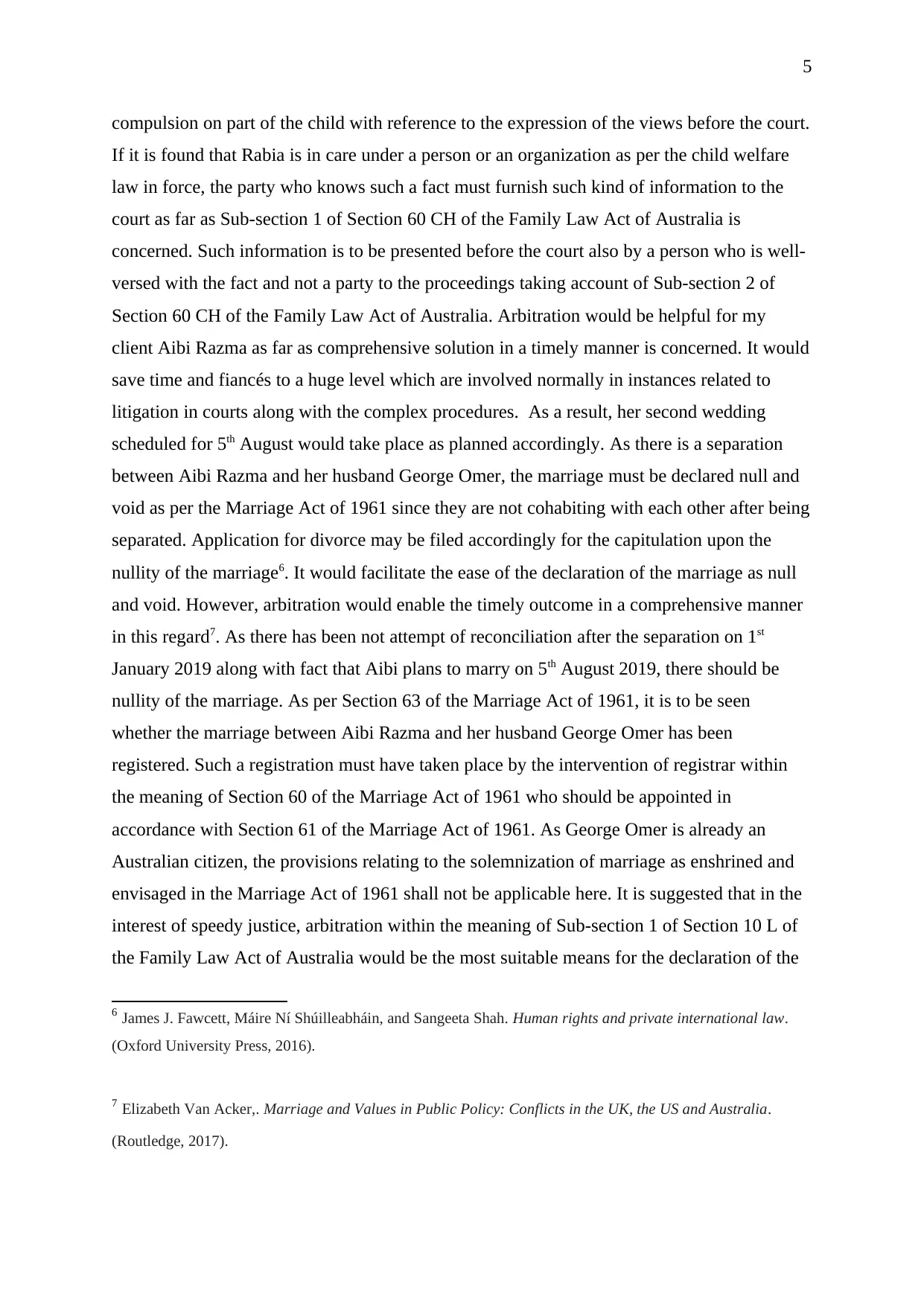
5
compulsion on part of the child with reference to the expression of the views before the court.
If it is found that Rabia is in care under a person or an organization as per the child welfare
law in force, the party who knows such a fact must furnish such kind of information to the
court as far as Sub-section 1 of Section 60 CH of the Family Law Act of Australia is
concerned. Such information is to be presented before the court also by a person who is well-
versed with the fact and not a party to the proceedings taking account of Sub-section 2 of
Section 60 CH of the Family Law Act of Australia. Arbitration would be helpful for my
client Aibi Razma as far as comprehensive solution in a timely manner is concerned. It would
save time and fiancés to a huge level which are involved normally in instances related to
litigation in courts along with the complex procedures. As a result, her second wedding
scheduled for 5th August would take place as planned accordingly. As there is a separation
between Aibi Razma and her husband George Omer, the marriage must be declared null and
void as per the Marriage Act of 1961 since they are not cohabiting with each other after being
separated. Application for divorce may be filed accordingly for the capitulation upon the
nullity of the marriage6. It would facilitate the ease of the declaration of the marriage as null
and void. However, arbitration would enable the timely outcome in a comprehensive manner
in this regard7. As there has been not attempt of reconciliation after the separation on 1st
January 2019 along with fact that Aibi plans to marry on 5th August 2019, there should be
nullity of the marriage. As per Section 63 of the Marriage Act of 1961, it is to be seen
whether the marriage between Aibi Razma and her husband George Omer has been
registered. Such a registration must have taken place by the intervention of registrar within
the meaning of Section 60 of the Marriage Act of 1961 who should be appointed in
accordance with Section 61 of the Marriage Act of 1961. As George Omer is already an
Australian citizen, the provisions relating to the solemnization of marriage as enshrined and
envisaged in the Marriage Act of 1961 shall not be applicable here. It is suggested that in the
interest of speedy justice, arbitration within the meaning of Sub-section 1 of Section 10 L of
the Family Law Act of Australia would be the most suitable means for the declaration of the
6 James J. Fawcett, Máire Ní Shúilleabháin, and Sangeeta Shah. Human rights and private international law.
(Oxford University Press, 2016).
7 Elizabeth Van Acker,. Marriage and Values in Public Policy: Conflicts in the UK, the US and Australia.
(Routledge, 2017).
compulsion on part of the child with reference to the expression of the views before the court.
If it is found that Rabia is in care under a person or an organization as per the child welfare
law in force, the party who knows such a fact must furnish such kind of information to the
court as far as Sub-section 1 of Section 60 CH of the Family Law Act of Australia is
concerned. Such information is to be presented before the court also by a person who is well-
versed with the fact and not a party to the proceedings taking account of Sub-section 2 of
Section 60 CH of the Family Law Act of Australia. Arbitration would be helpful for my
client Aibi Razma as far as comprehensive solution in a timely manner is concerned. It would
save time and fiancés to a huge level which are involved normally in instances related to
litigation in courts along with the complex procedures. As a result, her second wedding
scheduled for 5th August would take place as planned accordingly. As there is a separation
between Aibi Razma and her husband George Omer, the marriage must be declared null and
void as per the Marriage Act of 1961 since they are not cohabiting with each other after being
separated. Application for divorce may be filed accordingly for the capitulation upon the
nullity of the marriage6. It would facilitate the ease of the declaration of the marriage as null
and void. However, arbitration would enable the timely outcome in a comprehensive manner
in this regard7. As there has been not attempt of reconciliation after the separation on 1st
January 2019 along with fact that Aibi plans to marry on 5th August 2019, there should be
nullity of the marriage. As per Section 63 of the Marriage Act of 1961, it is to be seen
whether the marriage between Aibi Razma and her husband George Omer has been
registered. Such a registration must have taken place by the intervention of registrar within
the meaning of Section 60 of the Marriage Act of 1961 who should be appointed in
accordance with Section 61 of the Marriage Act of 1961. As George Omer is already an
Australian citizen, the provisions relating to the solemnization of marriage as enshrined and
envisaged in the Marriage Act of 1961 shall not be applicable here. It is suggested that in the
interest of speedy justice, arbitration within the meaning of Sub-section 1 of Section 10 L of
the Family Law Act of Australia would be the most suitable means for the declaration of the
6 James J. Fawcett, Máire Ní Shúilleabháin, and Sangeeta Shah. Human rights and private international law.
(Oxford University Press, 2016).
7 Elizabeth Van Acker,. Marriage and Values in Public Policy: Conflicts in the UK, the US and Australia.
(Routledge, 2017).
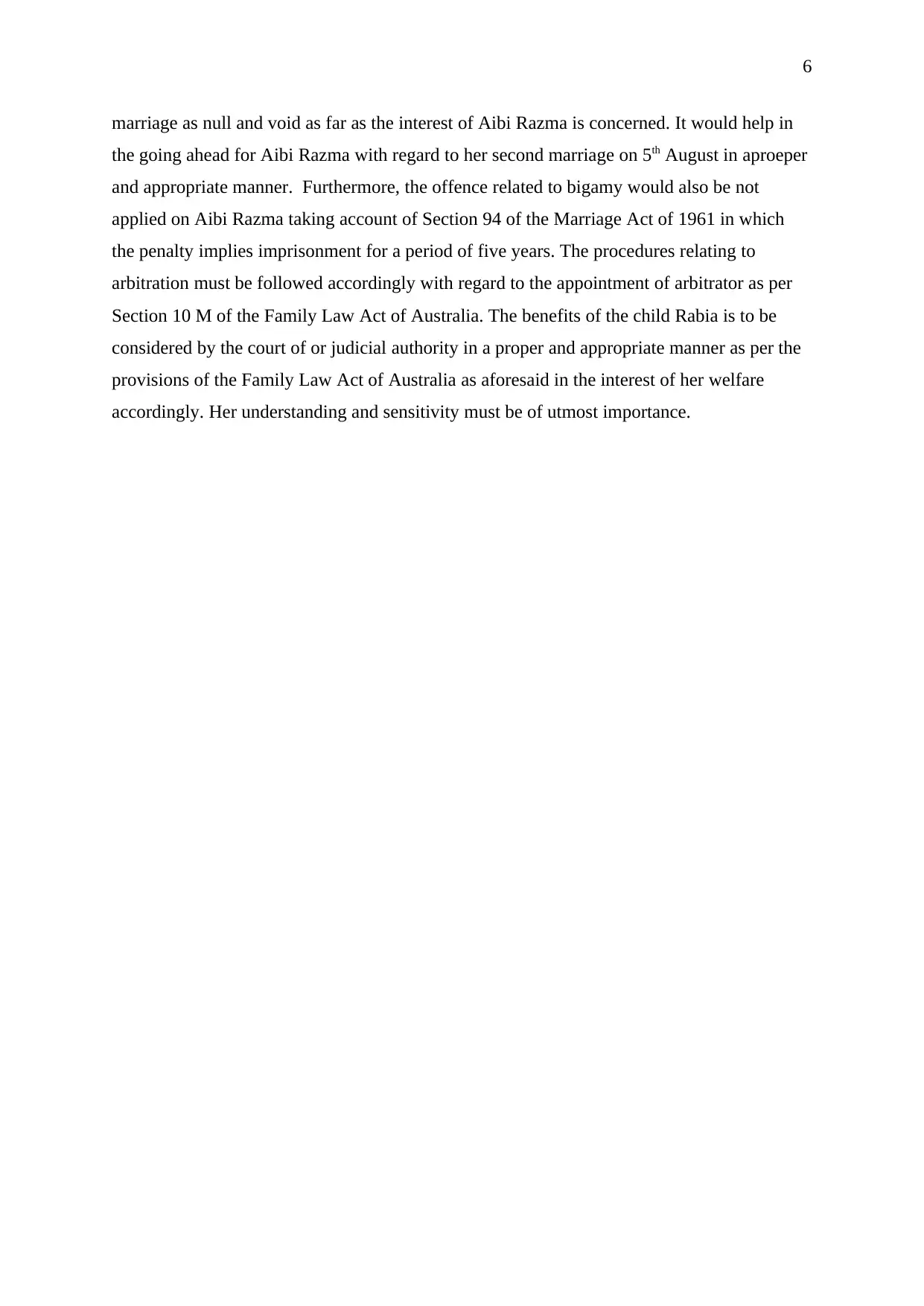
6
marriage as null and void as far as the interest of Aibi Razma is concerned. It would help in
the going ahead for Aibi Razma with regard to her second marriage on 5th August in aproeper
and appropriate manner. Furthermore, the offence related to bigamy would also be not
applied on Aibi Razma taking account of Section 94 of the Marriage Act of 1961 in which
the penalty implies imprisonment for a period of five years. The procedures relating to
arbitration must be followed accordingly with regard to the appointment of arbitrator as per
Section 10 M of the Family Law Act of Australia. The benefits of the child Rabia is to be
considered by the court of or judicial authority in a proper and appropriate manner as per the
provisions of the Family Law Act of Australia as aforesaid in the interest of her welfare
accordingly. Her understanding and sensitivity must be of utmost importance.
marriage as null and void as far as the interest of Aibi Razma is concerned. It would help in
the going ahead for Aibi Razma with regard to her second marriage on 5th August in aproeper
and appropriate manner. Furthermore, the offence related to bigamy would also be not
applied on Aibi Razma taking account of Section 94 of the Marriage Act of 1961 in which
the penalty implies imprisonment for a period of five years. The procedures relating to
arbitration must be followed accordingly with regard to the appointment of arbitrator as per
Section 10 M of the Family Law Act of Australia. The benefits of the child Rabia is to be
considered by the court of or judicial authority in a proper and appropriate manner as per the
provisions of the Family Law Act of Australia as aforesaid in the interest of her welfare
accordingly. Her understanding and sensitivity must be of utmost importance.
⊘ This is a preview!⊘
Do you want full access?
Subscribe today to unlock all pages.

Trusted by 1+ million students worldwide
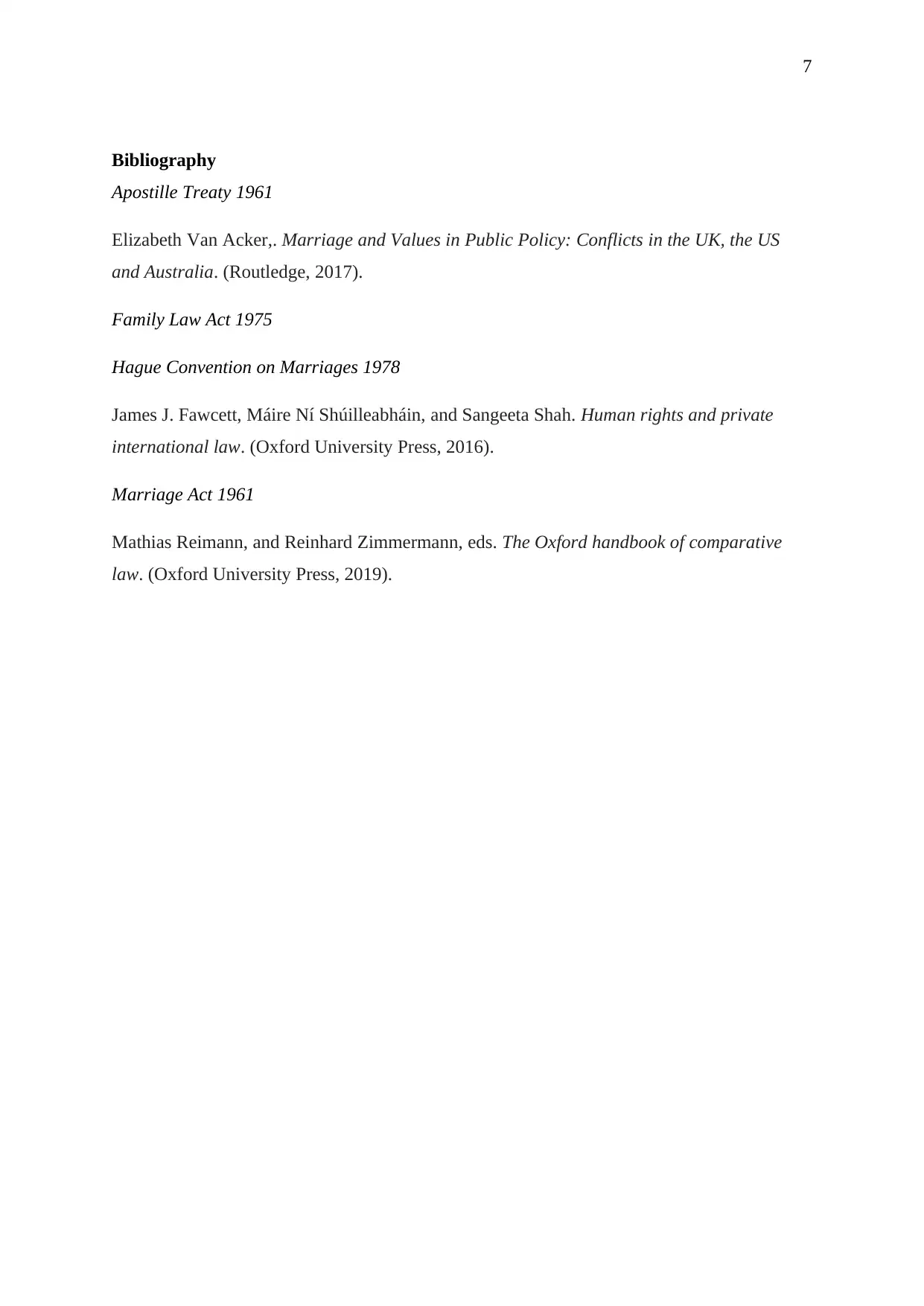
7
Bibliography
Apostille Treaty 1961
Elizabeth Van Acker,. Marriage and Values in Public Policy: Conflicts in the UK, the US
and Australia. (Routledge, 2017).
Family Law Act 1975
Hague Convention on Marriages 1978
James J. Fawcett, Máire Ní Shúilleabháin, and Sangeeta Shah. Human rights and private
international law. (Oxford University Press, 2016).
Marriage Act 1961
Mathias Reimann, and Reinhard Zimmermann, eds. The Oxford handbook of comparative
law. (Oxford University Press, 2019).
Bibliography
Apostille Treaty 1961
Elizabeth Van Acker,. Marriage and Values in Public Policy: Conflicts in the UK, the US
and Australia. (Routledge, 2017).
Family Law Act 1975
Hague Convention on Marriages 1978
James J. Fawcett, Máire Ní Shúilleabháin, and Sangeeta Shah. Human rights and private
international law. (Oxford University Press, 2016).
Marriage Act 1961
Mathias Reimann, and Reinhard Zimmermann, eds. The Oxford handbook of comparative
law. (Oxford University Press, 2019).
1 out of 7
Your All-in-One AI-Powered Toolkit for Academic Success.
+13062052269
info@desklib.com
Available 24*7 on WhatsApp / Email
![[object Object]](/_next/static/media/star-bottom.7253800d.svg)
Unlock your academic potential
Copyright © 2020–2026 A2Z Services. All Rights Reserved. Developed and managed by ZUCOL.